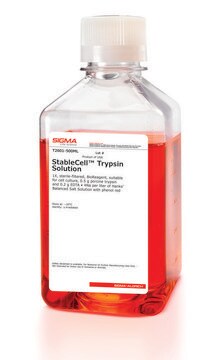T4299
Solution de trypsine-EDTA
1 ×, sterile-filtered, BioReagent, suitable for cell culture, 500 BAEE units porcine trypsin and 180 μg EDTA, 4Na per ml in Dulbecco′s PBS without calcium and magnesium
Synonyme(s) :
Cocoonase, Tryptar, Tryptase
About This Item
Produits recommandés
Source biologique
Porcine pancreas
Niveau de qualité
Stérilité
sterile-filtered
Gamme de produits
BioReagent
Forme
solution
Concentration
1 ×
Technique(s)
cell culture | mammalian: suitable
Impuretés
Porcine parvovirus, none detected (9 CFR)
pH
7.0-7.6
Conditions d'expédition
dry ice
Température de stockage
−20°C
Vous recherchez des produits similaires ? Visite Guide de comparaison des produits
Application
Actions biochimiques/physiologiques
Serine protease inhibitors, including DFP, TLCK, APMSF, AEBSEF, and aprotinin, amongst others, will inhibit Trypsin.
Composants
Attention
Produit(s) apparenté(s)
Code de la classe de stockage
12 - Non Combustible Liquids
Classe de danger pour l'eau (WGK)
nwg
Point d'éclair (°F)
Not applicable
Point d'éclair (°C)
Not applicable
Certificats d'analyse (COA)
Recherchez un Certificats d'analyse (COA) en saisissant le numéro de lot du produit. Les numéros de lot figurent sur l'étiquette du produit après les mots "Lot" ou "Batch".
Déjà en possession de ce produit ?
Retrouvez la documentation relative aux produits que vous avez récemment achetés dans la Bibliothèque de documents.
Les clients ont également consulté
Notre équipe de scientifiques dispose d'une expérience dans tous les secteurs de la recherche, notamment en sciences de la vie, science des matériaux, synthèse chimique, chromatographie, analyse et dans de nombreux autres domaines..
Contacter notre Service technique






